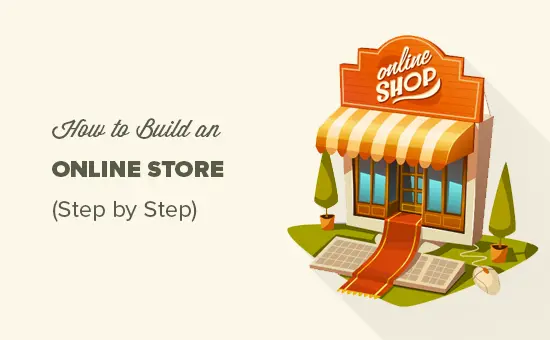Launch Your Dream: A Step-by-Step Guide to Starting an Online Store in 2024

Introduction
Starting an online store is an exciting venture for any entrepreneur looking to tap into the booming e-commerce market. With digital sales soaring, the opportunity to reach a global audience has never been more accessible. This guide will walk you through the necessary steps to launch your online store, from the initial planning phase to opening your digital doors to the world.
Table of Contents
Understanding the Basics of E-commerce
Before diving into the mechanics of opening your store, it’s crucial to understand what makes an online business successful. E-commerce offers vast opportunities but also presents unique challenges. Understanding these can help you better prepare and increase your chances of achieving success in the digital marketplace.
Step 1: Decide on Your Niche
Selecting a niche is the first step in starting an online store. A well-defined niche helps you cater to a specific customer base and differentiates your store from competitors.
- Identify Your Interests and Expertise: Start with what you know and love. Passion drives persistence.
- Research Market Demand: Use tools like Google Trends and Keyword Planner to analyze the popularity and competitiveness of your potential niche.
- Evaluate Profitability: Ensure that your chosen niche can be profitable by considering product pricing, availability, and shipping costs.
Step 2: Source Your Products
After defining your niche, the next step is to decide what products to sell and how to source them.
- Manufacture, Dropship, or Wholesale: Choose a sourcing strategy that aligns with your business model and budget.
- Find Reliable Suppliers: Use platforms like Alibaba or local suppliers to find high-quality products.
- Order Samples: Always test product quality before committing to large orders.
Step 3: Choose the Right E-commerce Platform
Selecting the right platform is crucial as it will host your online store. It should be scalable, user-friendly, and compatible with your business needs.
- Popular Platforms: Consider Shopify, WooCommerce, or BigCommerce, based on your technical skills and budget.
- Customization Options: Ensure the platform allows for customization to match your brand’s style and functionality needs.
Step 4: Set Up Your Online Store
With your platform selected, it’s time to build your store. This involves several critical tasks:
- Design Your Store: Create a clean, navigable website that reflects your brand.
- Upload Product Listings: Include high-quality images and detailed product descriptions.
- Set Up Payment Processing: Integrate secure payment gateways like PayPal, Stripe, or Shopify Payments.
Step 5: Legal and Administrative Requirements
Handling the legalities properly is essential for any business:
- Register Your Business: Depending on your location, this might involve registering as an LLC, sole proprietorship, or another entity.
- Obtain Necessary Permits and Licenses: Check local laws to see what’s required for operating an online business.
- Understand Tax Obligations: Set up systems to collect and handle sales tax, if applicable.
Step 6: Prepare for Launch
Before you officially launch, make sure everything is in place for a smooth start:
- Test Your Website: Ensure all links, payment systems, and functionalities work seamlessly.
- Stock Inventory: If not dropshipping, make sure you have enough inventory to meet anticipated demand.
- Plan Your Launch: Consider special promotions or events to generate interest and attract your first customers.
Step 7: Market Your Online Store
Marketing is critical to attract customers and drive sales:
- SEO Strategies: Optimize your site for search engines to improve visibility.
- Social Media Marketing: Leverage platforms like Instagram, Facebook, and Pinterest to reach your target audience.
- Email Marketing: Build an email list and engage customers with offers, news, and product updates.
Decide on Your Business Structure
By this point, you’re probably bouncing in your seat, ready to get started. However, there are a few legal things you’ll have to take care of in order to make your business official. This includes an official filing that ensures that the government recognizes your business. It additionally includes decisions that will affect your eligibility for business funding, tax obligations, personal protections, and more.

First and foremost, you need to decide how your business will be structured. Here are some of the most common types of business:
- Sole proprietorship: This means you and your business are legally and financially linked together. This is the simplest form of business to start. That said, you cannot operate as an employer. Instead, you operate and run the business as an individual.
- Limited Liability Company (LLC): This option lets you keep your personal and business assets separate, lowering the risk of starting a business. LLCs are relatively quick to set up and offer various business tax benefits.
- Partnership: If you’re starting your business with two or more business partners, you’ll need to sign a partner agreement, which determines how you’ll split duties and profits. This agreement will track each partner’s roles, responsibilities, investments, and rights.
- Corporation: A corporation usually refers to an established business that includes shareholders and employees. There are various types of corporations you can create. An individual or group of people can initiate corporations.

What Steps Are Involved In Starting an Online Store?
- Define Your Niche and Target Audience: Determine the specific market segment you want to serve and understand their preferences and needs.
- Choose Your Business Model: Decide whether you will sell your products, drop-ship, or use a print-on-demand service.
- Source Your Products: If not using dropshipping, find suppliers or manufacturers who can provide quality products consistently.
- Choose an E-commerce Platform: Select a platform like Shopify, WooCommerce, or BigCommerce that fits your technical skills, budget, and business needs.
- Set Up Your Online Store: Design your website, upload products, and configure essential settings such as payment gateways and shipping options.
- Handle Legalities: Register your business, obtain necessary licenses and permits, and understand your tax obligations.
- Prepare for Launch: Test your website thoroughly to ensure everything works smoothly.
- Market Your Store: Use SEO, social media marketing, email marketing, and other strategies to attract and retain customers.
- Launch Your Store: Open your store to the public with any initial promotions or launch events planned.
- Analyze and Optimize: Continuously monitor the performance of your store and make adjustments to improve user experience and increase sales.
Frequently Asked Questions
Q: What is the best platform for starting an online store?
A: The best platform depends on your specific needs. Shopify is excellent for beginners, while WooCommerce offers more customization for those with WordPress experience.
Q: How much does it cost to start an online store?
A: Costs can vary widely based on your business model and platform. Expect initial costs for website setup, inventory, and marketing.
Q: Can I start an online store without inventory?
A: Yes, dropshipping is a popular model that doesn’t require you to hold inventory. Instead, products are shipped directly from the supplier to the customer.
Q: How do I market my online store?
A: Effective marketing strategies include SEO, pay-per-click advertising, social media marketing, content marketing, and email campaigns. Tailoring these strategies to your target audience increases the chances of attracting and retaining customers.
Q: What are the critical elements of a successful online store?
A: A successful online store should have an easy-to-navigate design, high-quality product images, detailed product descriptions, a secure payment gateway, excellent customer service, and a robust marketing strategy.
Q: How long does it take to set up an online store?
A: The time to set up an online store can vary from a few days to several months, depending on the complexity of the store, the platform used, and the completeness of the business plan and preparations.
Q: Do I need technical skills to start an online store?
A: While having technical skills can be beneficial, especially for customization and troubleshooting, many e-commerce platforms are designed for users who need to gain prior technical knowledge. These platforms provide tools and support to help set up and manage your store.
Q: What are common challenges in starting an online store?
A: Common challenges include finding the right products to sell, setting competitive pricing, driving traffic to the website, managing inventory and supply chain issues, and maintaining customer satisfaction and loyalty.
Conclusion
Starting an online store in 2024 can be a fulfilling and profitable venture. By following these steps and dedicating yourself to continuous learning and adaptation, you can build a successful e-commerce business that stands out in the digital marketplace.






